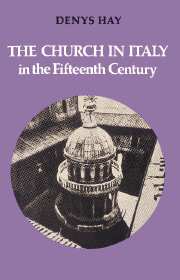Book contents
- Frontmatter
- Contents
- PREFACE
- 1 The problems of Italian church history
- 2 Diocesan and parochial organisation
- 3 The Schism in Italy: the emergence of an Italian papacy
- 4 The state of the clergy and laity in fifteenth-century Italy
- 5 The quality of Italian religious life. Reform
- 6 The Italian Renaissance and the clergy of Italy in the fifteenth century
- APPENDIX
- NOTES
- REFERENCES
- INDEX (NOT INCLUDING APPENDICES)
3 - The Schism in Italy: the emergence of an Italian papacy
Published online by Cambridge University Press: 22 October 2009
- Frontmatter
- Contents
- PREFACE
- 1 The problems of Italian church history
- 2 Diocesan and parochial organisation
- 3 The Schism in Italy: the emergence of an Italian papacy
- 4 The state of the clergy and laity in fifteenth-century Italy
- 5 The quality of Italian religious life. Reform
- 6 The Italian Renaissance and the clergy of Italy in the fifteenth century
- APPENDIX
- NOTES
- REFERENCES
- INDEX (NOT INCLUDING APPENDICES)
Summary
In chapter 1 it was stated that Pastor's History of the Popes was, all in all, the most up-to-date account available of the popes of this period, whether collectively or individually. There is no adequate modern biography of any fifteenth-century pope, with the possible exception of Pius II whose autobiography has formed the basis of several recent works, as noted above. This does not, of course, mean that there are not many extremely important monographs on particular aspects or policies of particular popes; a bibliography of such studies would be a substantial affair, although it may be guessed that it would consist mainly of studies dealing with foreign relations. It is a matter for astonishment that no one has written solidly about Eugenius IV, whose importance in Italian .church history will emerge in the later pages of this book, nor about the popes who followed Pius II. ‘Life and Times’ biographies are unpopular now, but if the scholar does not need the Times he does still need the Lives: and in fact the times need investigation too, since far more research has been devoted recently to the fourteenth century, when the popes were at Avignon, and the sixteenth century when the Reformation occurred, than to the period between.
It is admittedly not easy to abstract from the Vatican Archives material of purely Italian significance. As one turns the great folios of the Obligationes et Solutiones, of the Introitus and Exitus, of Supplicationes and the other series, it is striking how the affairs of Christendom at large obtrude themselves, and it is often difficult to disentangle ‘foreign’ business from ‘Italian’.
- Type
- Chapter
- Information
- The Church in Italy in the Fifteenth CenturyThe Birkbeck Lectures 1971, pp. 26 - 48Publisher: Cambridge University PressPrint publication year: 1977



